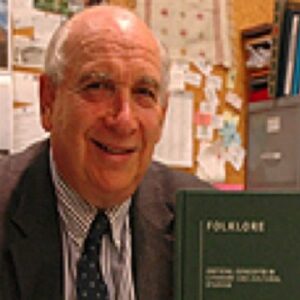Alan Dundes was a well-known folklorist and an anthropology professor at the University of California, Berkeley. He was a driving force behind the rise of folklore as a respected academic discipline. He worked on popular cultures, such as chain letters, light-bulb jokes, and restroom graffiti, as a folklore expert. Folklore, he claims, deals with the core of life. He explained the presence of folklore in every section of society through his works. He wrote over 250 scholarly articles and numerous books, the most notable of which are Parsing Through Customs: Essays by a Freudian Folklorist and The Vampire: A Casebook. Seeing Is Believing is one of his most well-known pieces, in which he claims that Americans value sight more than other senses. He became famous around the world for his Freudian analyses of anything from fairy tales to football. As a folklorist, his contributions have enhanced the field of modern folklore studies. He even mentored a number of well-known figures in this field. He was an expert on a variety of subjects, including literature, games, and different cultures. He received several significant accolades as a notable folklorist, including the Pitre Prize and a Guggenheim Fellowship.
Childhood and Adolescence
Alan Dundes was born in New York City, the son of a lawyer and a musician. Yale University awarded him a bachelor’s and master’s degree in English literature.
He received training to become a naval communications officer after completing his education. He attended Indiana University and obtained a Ph.D. in folklore in 1962 after two years of service servicing artillery cannons on a ship in the Mediterranean.
Alan Dundes’s Career
In 1963, he joined the University of California, Berkeley, after beginning his career as a teacher at the University of Kansas. He taught folklore as a branch of anthropology at this university. He was in the same position for 42 years.
Students were introduced to various forms of folklore, such as stories, myths, folk speech, folk belief, and so on, in the folklore course he taught. He also spoke about American folklore and the psychoanalytic approach to folklore and its history from a global perspective.
He was well-liked in university because of his broad cultural knowledge. He became a darling among his students and the media for his teaching expertise as well as his wit and charm.
He also supported Berkeley University’s New Student Orientation Program and frequently gave the opening talk at summer orientation programs when students’ opinions on the manner of education were sought.
Berkeley University’s Anthropology department established a master’s degree program in folklore as a result of his efforts. An archive with more than 500,000 folklore artifacts was established as part of this endeavor.
His writings, seminars, and efforts as a folklorist frequently sparked debate. Examining the New Testament and the Qur’an were two of these projects.
One of his pieces, Into the Endzone for a Touchdown, which examines the homoerotic undertones implicit in the rituals and terminologies surrounding American football, has even prompted death threats.
As president of the American Folklore Society in 1980, he delivered a speech that was eventually published under the title Life is Like a Chicken Coop Ladder.
In his later years, he was given a $1,000,000 check, which he used to endow the university with a prominent professorship in Folkloristics. This insured that folklore would continue to be taught in the department after he retired.
His Major Projects
In 1991, he released Never Try to Teach a Pig to Sing. He addressed modern folklore in this book, which included T-shirt slogans, ethnic sexual remarks, and a variety of exchanges shared through office copier machines.
Achievements & Awards
He was awarded the Pitre Prize for his lifelong contribution to folklore in 1993. The following year, he was awarded the UC Berkeley Distinguished Teaching Award for his outstanding teaching abilities.
Personal History and Legacy
Alan Dundes was married to Carolyn and had three children with her: David, Lauren, and Alison. His son David works as an information technology manager, Lauren as a sociology professor, and Alison as a political science and anthropology professor.
He was the first folklorist to be elected to the American Academy of Arts and Sciences in 2001. Brian Flemming, the director of the documentary The God Who Wasn’t There, interviewed him shortly before his death.
He collapsed unexpectedly during a presentation at the University of California, Berkeley, due to a heart attack. At the age of 70, he passed away.
Estimated Net worth
Alan Dundes has a net worth of $ USD 6 million and earns a living as a university professor and anthropologist.
Trivia
He was chastised for his use of psychoanalysis in his writings. He provided a psychosexual reading of the Apollo lunar landing in one of his books. Through this analysis, he created a brother-sister relationship between the Sun and the Moon.
He was always eager to get to know every one of his students on a personal level. As a result, students waited in line at the University of Berkeley during office hours to interact with him one-on-one.
He was a workaholic, according to his wife. Football and baseball were two of his favorite sports to watch. He was a voracious reader who devoured everything he could get his hands on. As a result, his Berkeley home was crammed with books in every nook and cranny.


